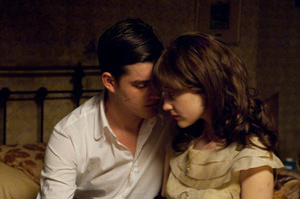A Graham Greene Classic Better Left Alone
The original "Brighton Rock" is so good -- in its dank and sometimes almost unwatchable way -- that it obviates a remake. But that never stopped anyone, did it?The original "Brighton Rock" is so good that it obviates a remake. But that never stopped anyone, did it?
“Brighton Rock,” published in 1938, began Graham Greene’s crossover from his very entertaining “entertainments,” featuring spies and other dubious characters, to more religiously haunted works, having to do, mainly, with the mysterious workings of grace under pressure from human carelessness and perversity. A movie version, notable for a sort of strangulated intensity, and featuring a truly great performance by the young Richard Attenborough as Pinkie Brown, a murderously amoral teen-aged gangster, came out in 1947. It is one of the darkest, most claustrophobic films noir ever made.
The original “Brighton Rock” is so good — in its dank and sometimes almost unwatchable way — that it obviates a remake. But that never stopped anyone, did it? And so we have this pallid movie by Rowan Joffe (son of the director Roland Joffe), which, for no particular reason, updates the setting to 1964, when Britain was plagued by teenage rioting. The commotion is irrelevant and distracting to the story, part of the genius of which was to posit a particularly nasty underworld operating beneath the surface of the mirthless lower-class playground that is Brighton.
Otherwise, it is relatively faithful to what has gone before. Pinkie (played rather colorlessly by Sam Riley), still seeks to avenge the murder of one of his colleagues and, not incidentally, to rise in the underworld pecking order. Along his way, he acquires a dreary, pitiably naive girlfriend, Rose (Andrea Riseborough), who has evidence that links him to the revenge killing he has now committed. Eventually, he marries her on the grounds that she cannot testify against him should he be charged with his crime. Talk about your loveless marriages — at least on his part. She, on the other hand, is entirely smitten in her dopey little way.
Like it or leave it, what gives this film its distinction are two elements. One is intrinsic to Greene’s original concept — Pinkie’s Catholicism, of all things. He knows he’s evil, and he fears eternal damnation for his deeds on earth. I don’t know if that’s a plausible fear for this sweaty little twerp to entertain, and I’m damn sure Riley doesn’t capture it as effectively as Attenborough did, but it is a thought to conjure with and a nice contrast to Rose’s Catholicism, which is of a more innocent variety.
The other thing that sets this film apart is Helen Mirren’s ferocious performance as Ida. She’s Rose’s employer in a restaurant (an upgrade from the prostitute that Ida was in Greene’s novel), an occasional lover of the man killed for revenge and a relentless pursuer of Pinkie for the murder. She’s a whirlwind of activity and sexy, too. She gives the film what it has in the way of energy.
Oh, all right, to be fair, it has a couple of set pieces which have the capacity to stir us — notably a sequence where Pinkie is encouraged by Rose to go into a studio and make a recording in which he supposedly testifies to his love for her. Naturally, he records his loathing for her, which provides a final irony — an incidental grace note that grants this lugubrious film not exactly a happy ending, but a spiritually satisfying one — yada, yada, yada.
I have always been one to grant Greene absolution for his religious swoonings. They were just a harmless nuisance to me, given his very real gift for plotting, sharp characterizations and easy worldliness. It is no accident that most of his books were acquired by the movies and that he himself had successful careers as a screenwriter and dramatist. He was, yes, a middlebrow, but he aspired to, and sometimes attained, a higher seriousness. It was not quite art at the highest level, but it was not nothing either. It is not his fault that “Brighton Rock,” a book he is on record as saying may have been his best, cannot survive the expansionary ambitions of Rowan Joffe, the director’s feckless desire to open it up with scenic views, and rioting teens in pre-Beatles England. Less would have been more, though it’s hard to say how much less Joffe could have done scenically than director John Boulting claustrophobically did in 1947. On the whole, silence would have been the best choice of all. But that, of course, is not an option these days, is it?
Your support matters…Independent journalism is under threat and overshadowed by heavily funded mainstream media.
You can help level the playing field. Become a member.
Your tax-deductible contribution keeps us digging beneath the headlines to give you thought-provoking, investigative reporting and analysis that unearths what's really happening- without compromise.
Give today to support our courageous, independent journalists.






You need to be a supporter to comment.
There are currently no responses to this article.
Be the first to respond.